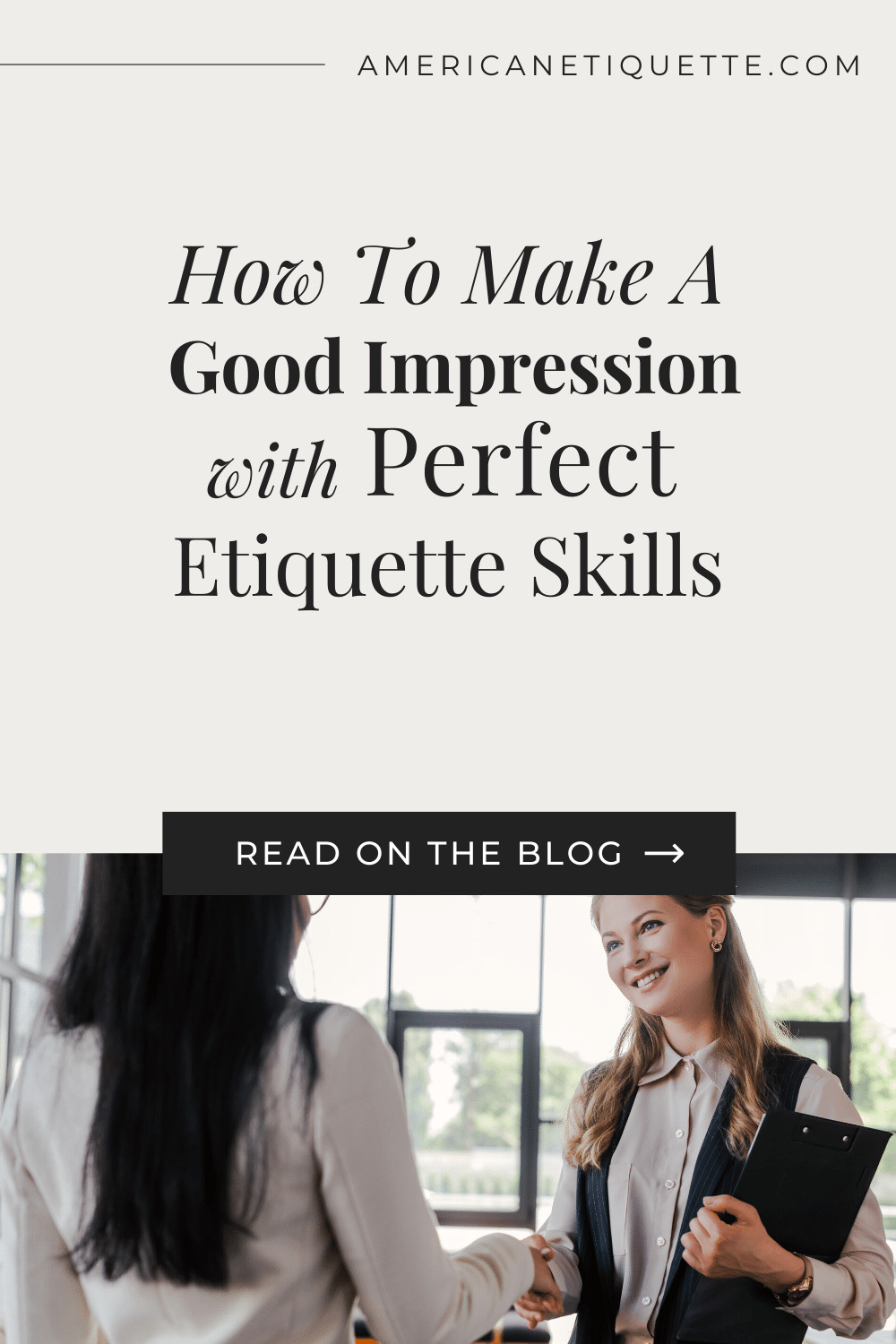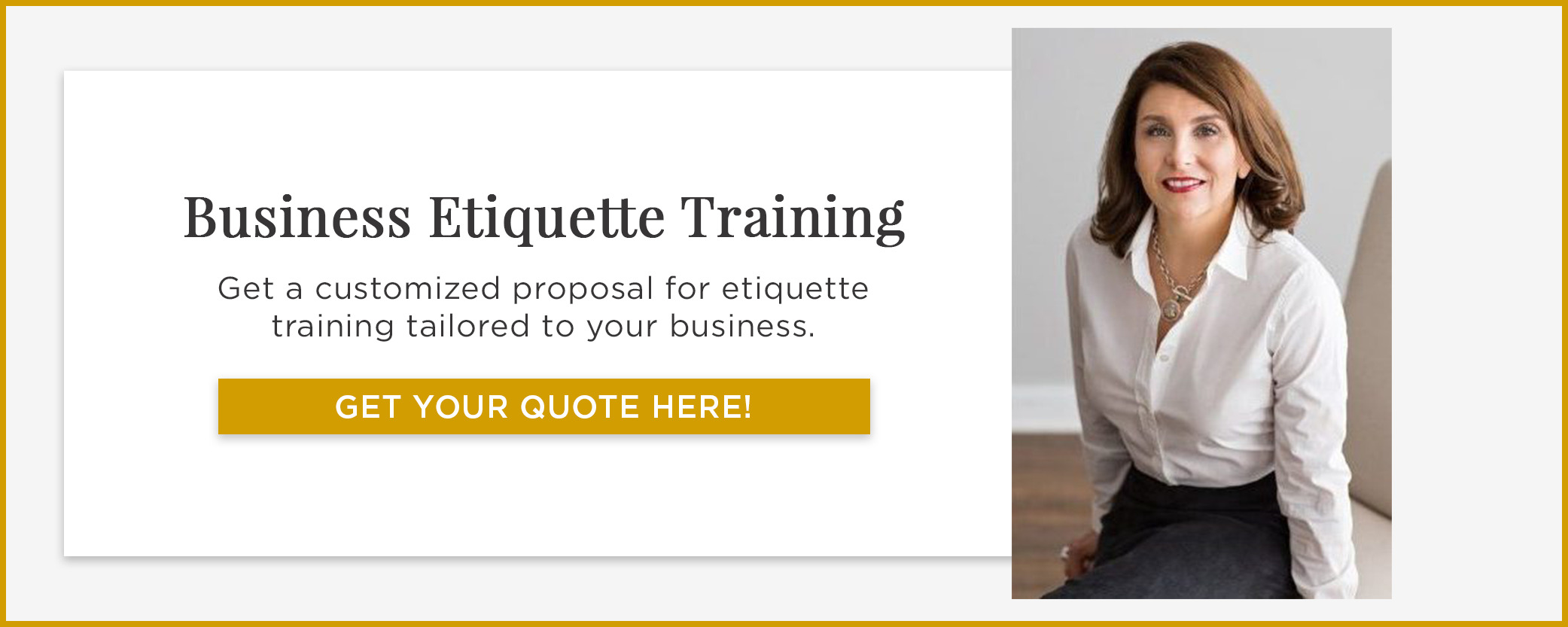Life is full of first encounters, which may leave you wondering how to make a good impression on all of the people you meet. From hiring new team members at work to forming business relationships with new clients, the human ability to adapt is one that shouldn’t be taken for granted!
One question I get asked all the time as an etiquette consultant is how to make a good impression at work and in life. People want to make sure they have the perfect etiquette skills to feel comfortable AND help others feel comfortable. No matter what social or professional situations you encounter, making a good impression will always be paramount.
Why Is Making A Good Impression So Important?
A good impression is important because it will last well beyond the first time you meet someone. And while it may be comforting to know a person’s opinion of you can change over time, you should never rely on a second interaction that may never come.
Making a good impression from the start triggers the warmth of achievement and confidence! Having etiquette skills will help you nail your interactions with others. That way, you can feel that warmth and confidence wherever you go.
All people are hard-wired to cast judgment on others—it is human nature! Your appearance, the way you walk into a room, the tone of your voice, and what you say to others all make a difference in how they feel about you.
Related: 5 Basics of Business Etiquette Everyone Needs To Know About
How To Make A Good Impression In 9 Steps
There are actions that you can take right now to make a good impression each and every time you meet someone. Take a look at this list and start making changes today.
Practice Good Body Language
Body language is extremely important to make a good impression. Make eye contact and stand up straight. Try to keep your shoulders back and your chin up when you first meet someone.
Walk into a room as if you know exactly where you are going! The way you carry your body comes long before any words that you might exchange—giving you the power to put others at ease as they watch you.
What’s more, posing as a confident person will make you feel exactly that! Studies suggest that a strong posture and assured movements will improve the way you think about yourself and help you feel prepared for whatever comes your way.
Dress The Part To Make A Good Impression
Your appearance matters quite a bit when making a good impression. Dress for the part you want to play!
For example, if you are walking into a business meeting, you want to look professional. Your clothes in this scenario communicate that you take the job seriously.
The clothes that you choose for yourself can help you blend in or stand out as desired.
Plus, your appearance helps you shine from the inside out. If you look good, you feel good. Right? It’s like a circle, creating extra confidence.
Be Polite and Put Your Best Foot Forward
Always be polite no matter what. To make a good impression, you have to be the best version of yourself as often as possible.
This includes even when you think that nobody is watching! There’s a TON of power in being genuine—so do kind things even when you aren’t trying to make an impression. You never know who will see what you’re doing and be impressed by the way you interact with others.
Have A Good Attitude
Attitude is crucial when making a good impression. It can make or break you, especially as a professional who faces loads of unpredictable problems on a regular basis. The way you handle the unexpected says a lot about you.
Imagine that you exit a business meeting and realize that your car has a parking ticket on the windshield. Letting anger overtake you at that moment would be untimely and inappropriate. Instead, acknowledge your misfortune by saying something like, “Oh, I never even saw that sign!”
Redirect and carry on. A good attitude is a sign of strength.
Find Common Ground
Studies show that people make the strongest connections when they have things in common. To make a good impression, you should leverage what you know (or what you can find out) about the person you are meeting for the first time.
The Internet can be your friend here. If you know that you are about to meet the CEO of Chopsticks Central, you better know how to use their products and speak intelligently about their niche. On a personal level, it never hurts to chat over your similar taste in pets or interest in global travel.
Grow Your Emotional Intelligence
Emotional intelligence indicates that you can steer a conversation away from stress and disaster. When making a good impression, be sure to notice how the things that you are saying are making the other person feel.
There are some general rules—subjects to avoid—when practicing emotional intelligence, but mostly you must rely on your instincts to put others around you at ease.
When you aren’t sure how the people you are talking with are feeling, go ahead and ask with something like, “what are your thoughts on that?” Or say, “I meant to sound confident but may have sounded a bit harsh. Let me try again.”
Be Self Aware (Know Your Strengths)
Practice self-awareness to make a solid, good impression. There is no easier strategy for etiquette than to be the best version of yourself. Pretending to be someone radically different rarely works and makes future interactions nearly impossible.
If you are a jokester, allow yourself one or two appropriate zingers for each new interaction. If you are an empath, you may be most comfortable talking to others about their problems and feelings.
No matter what your social strengths seem to be, it never hurts to verify with your friends and family members! Make sure you are actually as good as you think you are before trying it out on someone new.
Prepare Talking Points Ahead Of Time
Rehearsal is a great way to prepare for situations when you might come in contact with someone new and important. See if you can charm yourself in the mirror before coming face-to-face with others.
Write down the most important things that you hope to convey when making your good impression and practice as though you are in a natural, organic conversation.
At the end of your professional encounters, it is almost always appropriate to refer back to your list and make sure that you haven’t missed anything. Using a list for interactions at work shows diligence and preparation.
Follow Up After You Make A Good Impression
You may think that your work is done when you say your goodbyes. However, best etiquette suggests that you circle back to the people you meet with an email or brief note to highlight some of the most important or memorable moments of your conversation.
A follow-up is often the cherry-on-top of a good impression made. Be sure not to overlook this step after professional meetings—it could be what sets you apart from others at your level!
Let the awkwardness of a poor first impression be a thing of the past. Just remember to put your best foot forward every time you step away from your home. With a few adjustments to your usual entrance, you can have the power to make a good impression at any time.
Want to adopt perfect business etiquette and look professional in every situation? Get a proposal for business etiquette training now. As an etiquette consultant, I’m here to help you nail your first impression and beyond.


